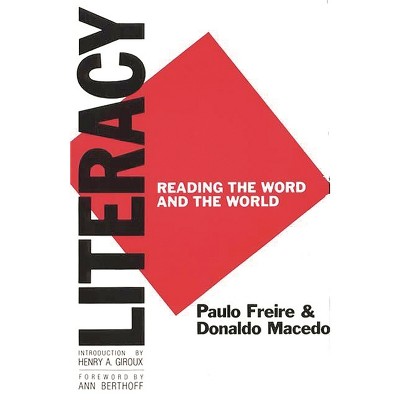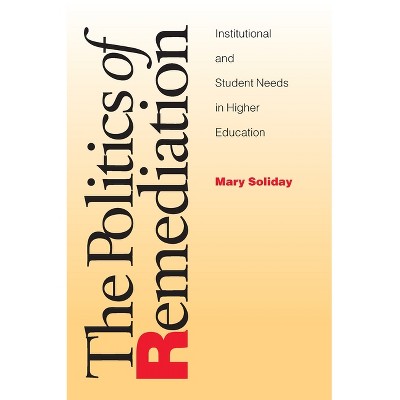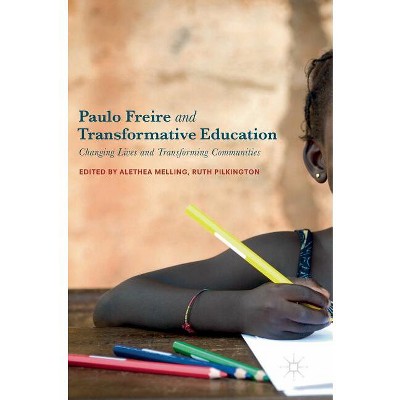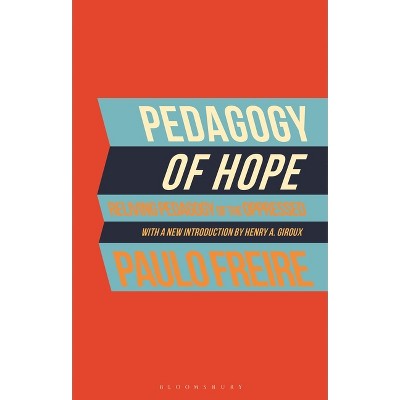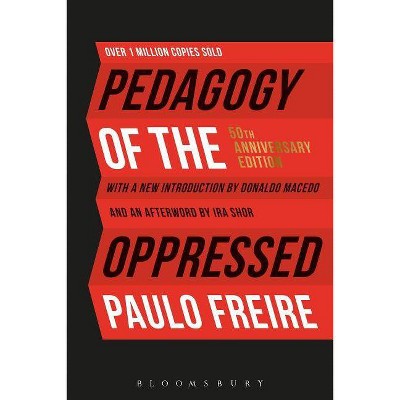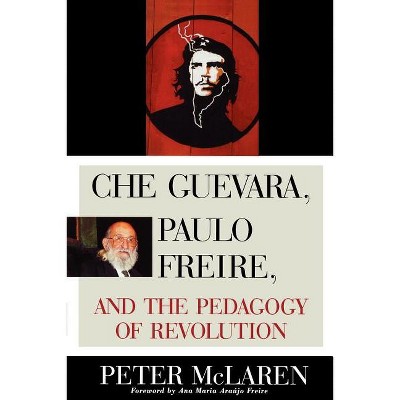Paulo Freire and the Cold War Politics of Literacy - by Andrew J KirKendall (Paperback)

$32.99 when purchased online
Target Online store #3991
About this item
Highlights
- In the twentieth century, illiteracy and its elimination were political issues important enough to figure in the fall of governments (as in Brazil in 1964), the building of nations (in newly independent African countries in the 1970s), and the construction of a revolutionary order (Nicaragua in 1980).
- About the Author: Andrew J. Kirkendall is professor of history at Texas A&M University and author of Class Mates: Male Student Culture and the Making of a Political Class in Nineteenth-Century Brazil.
- 264 Pages
- Biography + Autobiography, Political
Description
About the Book
Paulo Freire and the Cold War Politics of LiteracyBook Synopsis
In the twentieth century, illiteracy and its elimination were political issues important enough to figure in the fall of governments (as in Brazil in 1964), the building of nations (in newly independent African countries in the 1970s), and the construction of a revolutionary order (Nicaragua in 1980). This political biography of Paulo Freire (1921-97), who played a crucial role in shaping international literacy education, also presents a thoughtful examination of the volatile politics of literacy during the Cold War.A native of Brazil's impoverished northeast, Freire developed adult literacy training techniques that involved consciousness-raising, encouraging peasants and newly urban peoples to see themselves as active citizens who could transform their own lives. Freire's work for state and national government agencies in Brazil in the early 1960s eventually aroused the suspicion of the Brazilian military, as well as of U.S. government aid programs. Political pressures led to Freire's brief imprisonment, following the military coup of 1964, and then to more than a decade and a half in exile. During this period, Freire continued his work in Chile, Nicaragua, and postindependence African countries, as well as in Geneva with the World Council of Churches and in the United States at Harvard University.
Andrew J. Kirkendall's evenhanded appraisal of Freire's pioneering life and work, which remains influential today, gives new perspectives on the history of the Cold War, the meanings of radicalism, and the evolution of the Left in Latin America.
Review Quotes
An exemplary primer for the new student. Highly recommended.--Choice
Andrew Kirkendall's groundbreaking political biography of Freire brings together, for the first time, an archive fragmented by the great man's many travels and postings.--Latin American Review of Books
I would encourage any new revolutionary government interested in starting a literacy campaign to read this book's sober analysis of the problems encountered when going from theory to the real world. . . . This well-researched book does a fantastic job of illuminating an important aspect of the Cold War and should be in every syllabus on the history of education in Latin America.--Journal of Latin American Studies
In this well-written book, Andrew Kirkendall has taken the measure of the man and his utopian project from a much-needed post-Cold War vantage point.--Royal Institute of International Affairs
Kirkendall's book provides scholars with a rare view of Freire as a reluctant politician and historical figure . . . . For scholars interested in the socio-political limits and possibilities for curriculum implementation, this examination of how Freire's ideas were mutually adapted by the political actors of the Cold War raises some interesting questions about the post-Cold War significance of Freire's work.--History of Education Quarterly
This volume by Andrew J. Kirkendall is, in my judgment, the most authoritative account of the life and times of Paulo Freire. . . . An immensely informative and engaging account of one of the most important educators of our time.--The Americas
Well-researched and effectively written.--Hispanic American Historical Review
About the Author
Andrew J. Kirkendall is professor of history at Texas A&M University and author of Class Mates: Male Student Culture and the Making of a Political Class in Nineteenth-Century Brazil.Dimensions (Overall): 9.21 Inches (H) x 6.14 Inches (W) x .6 Inches (D)
Weight: .91 Pounds
Suggested Age: 22 Years and Up
Number of Pages: 264
Genre: Biography + Autobiography
Sub-Genre: Political
Publisher: University of North Carolina Press
Format: Paperback
Author: Andrew J KirKendall
Language: English
Street Date: December 1, 2014
TCIN: 1004354139
UPC: 9781469622248
Item Number (DPCI): 247-36-7115
Origin: Made in the USA or Imported
If the item details above aren’t accurate or complete, we want to know about it.
Shipping details
Estimated ship dimensions: 0.6 inches length x 6.14 inches width x 9.21 inches height
Estimated ship weight: 0.91 pounds
We regret that this item cannot be shipped to PO Boxes.
This item cannot be shipped to the following locations: American Samoa (see also separate entry under AS), Guam (see also separate entry under GU), Northern Mariana Islands, Puerto Rico (see also separate entry under PR), United States Minor Outlying Islands, Virgin Islands, U.S., APO/FPO
Return details
This item can be returned to any Target store or Target.com.
This item must be returned within 90 days of the date it was purchased in store, shipped, delivered by a Shipt shopper, or made ready for pickup.
See the return policy for complete information.






